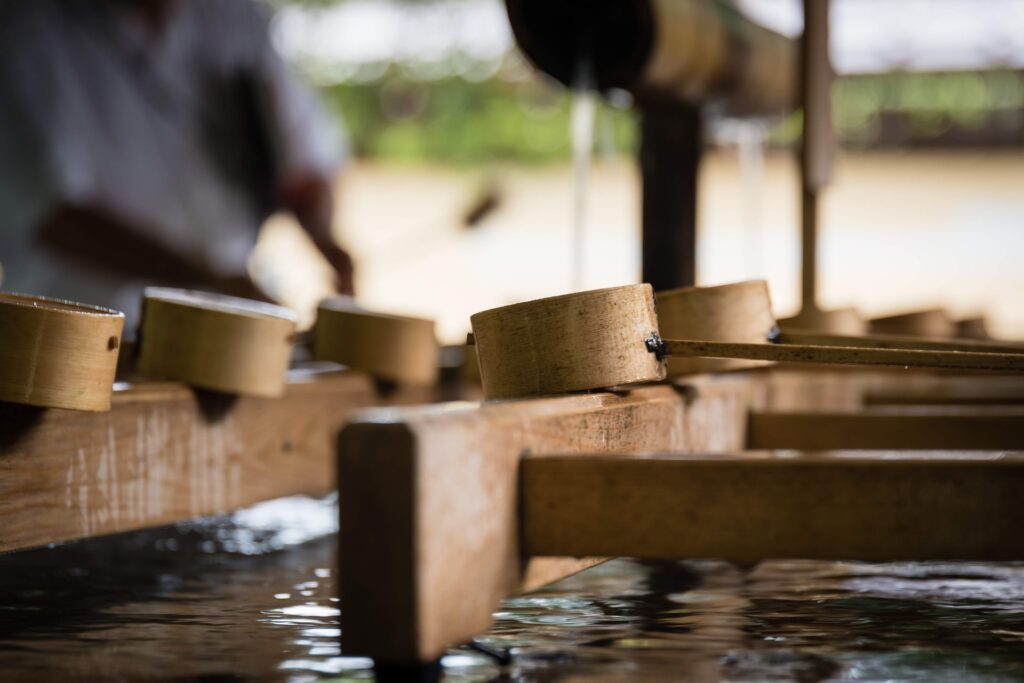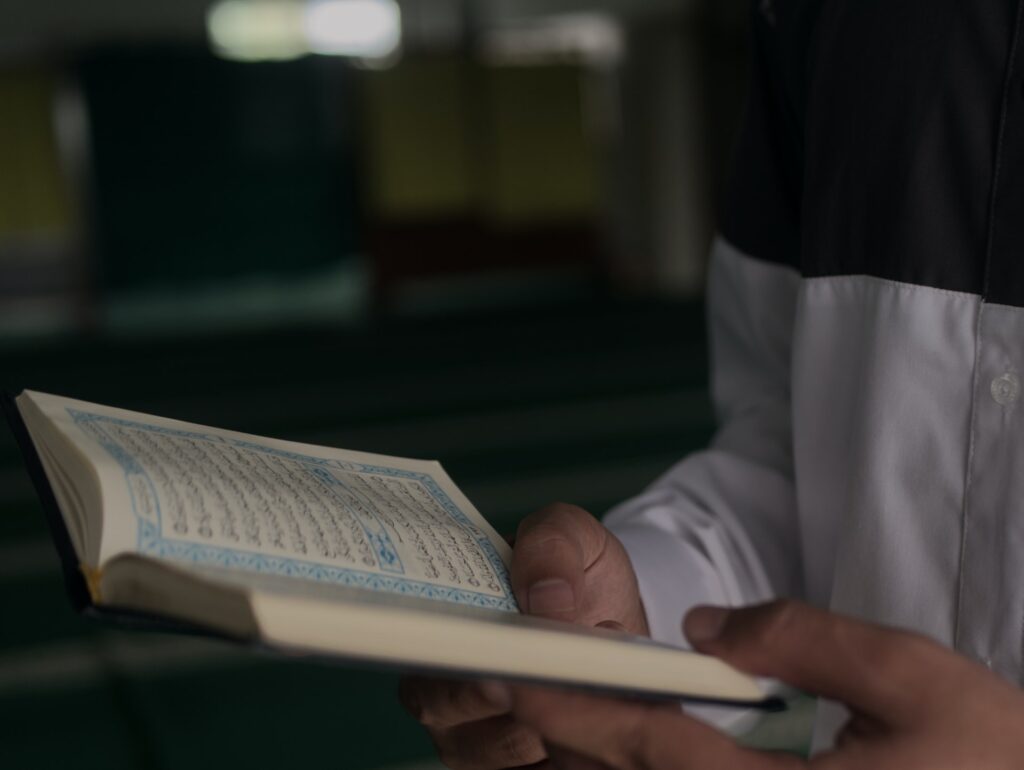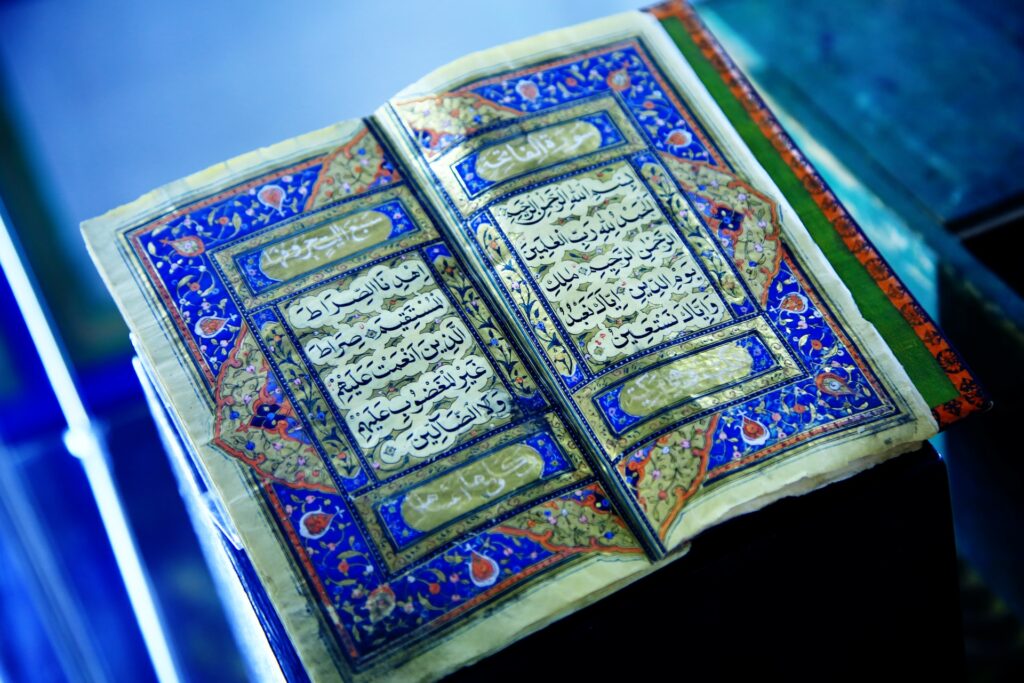A mechanical salat is like food without nutritional value.
If we had to summarize the whole religion, it would be two things:
– Relationship with Allah
– Relationship with His creation
Everything we do is a means to strengthen our bond with Allah.
Salat, zakat, fasting, hajj, and even our conduct towards the creation. All serve the same goal.
But salat has a particular status.
It’s a daily attempt to connect with Allah.
“His veil is light”, said Muhammad (PBUH) about Allah. And salat helps reduce the thickness of the veil.
So the ultimate purpose of praying is to bring us closer to Allah.
Anything and everything that stands in the way needs to be removed.
Many of us lack quality in our prayers. And that’s why we don’t see the benefits of it.
Instead of being a blessing, salat becomes this burden we carry everywhere.
Why do we want to improve the quality of our salat?
Because it’s the shortest way to Allah.
And the closer we get, the more blessings we’ll enjoy in both lives.
Focus vs Khushoo

Focusing on something is to concentrate on it and ignore everything else.
If we apply this definition to salat, we quickly understand that something is missing.
We can be focused on our salat and yet, don’t feel any connection with Allah.
We often translate the Arabic word khushoo’ with focus. But khushoo’ is more than that.
Khushoo’ in salat is understanding that we’re speaking to Allah.
It sounds simple. But it’s difficult to realize it.
Imagine you have at home the most noble, beautiful, knowledgeable, wise, powerful, and rich person on earth. This person can bring you peace and solve any of your problems.
- Would you like the company of anybody else?
- How would you behave in the presence of such a person?
- Would you turn your back and do something else?
So khushoo’ is keeping in mind that we are in Allah’s presence.
What we know about Allah is there’s nothing like Him. He’s more than anything we can imagine.
If we can have this realization, automatically our state will change.
We’ll show respect and humility. He will get our undividable attention. Our hearts will submit and the body will naturally follow.
As we can see, the solution for our broken prayers is in knowing Allah.
But can we know Him overnight? No.
So there’s no quick fix for our salat.
Improving the quality of our prayers is a lifelong effort.
The more we know about Him, the better we can connect to Him and enjoy our prayers.
The Different Ways to Improve Our Salat
We can improve the quality of our prayers from different angles. Some improvements are easy to put in place. Others require time.
1- Change Lifestyle

When it comes to setting good habits, our environment matters more than our motivation.
For example, it is easier to diet when there’s no junk food in your fridge.
So designing our environment makes succeeding easy.
Similarly, quality prayers become easier with the right lifestyle.
If you like hanging out late at the night, it becomes hard to be fully awake and enjoy the first prayer.
When I’m at work, I can’t always pray in time. And when I pray, it’s in a hurry.
So I want to be able in the future to work remotely. I’ll be happy to have the prayers rhythming my days and not the other way around.
But work is not the only reason my prayers lack quality.
2- Preparation For Salat

During the weekends, I’m at home writing my articles.
When it’s time to pray, my brain is still processing ideas.
It’s hard for me to switch from focusing on writing to focusing on salat.
This is why I loved the point of AbdulNasir Jangda: making salat an event.
Before going to work in the morning, we have a whole preparation process.
Because work is important, we take the time to be ready for it.
The same logic can be applied to salat.
Our encounter with Allah is far more important than any other activity.
We need a cut-off time to be in the right mode.
Having a proper wudu (ablution) and dressing for the occasion are all means to enter salat in a good state.
3- The Actual Salat

The rules and regulations of salat and how to perform it are straightforward.
Most Muslims have no problem with this part.
However, many of us haven’t memorized enough Quran to have variety in our prayers.
It can lead to boredom.
One solution is to read directly from the Quran while praying.
I start doing it, especially for the morning prayer. Now my salat lasts longer and I enjoy it more.
Another area of improvement is understanding the meaning of what we’re saying in salat.
AbdulNasir Jangda did a course about it called Meaningful Prayer.
I took this course last year and I loved the approach.
It’s going in-depth into the meanings of what we’re saying during salat.
For example, we open salat by saying Allah Akbar.
It’s generally translated as Allah is the greatest.
But what it really means is Allah is greater than…
The blank is intentional. The sentence is incomplete so we can customize it to our situation.
Allah is greater than my articles. Allah is greater than my problem.
Each one of us can put his/her own words.
Al-Fatiha: A Conversation with Allah
Al-Fatiha is at the core of our prayers. We repeat it 17 times during our daily five prayers.
A beautiful conversation takes place when we recite it.
When The Most Powerful is responding, the least we can do is to give the conversation its proper value.
In a hadith Qudsi, the Prophet (PBUH) told us how this conversation goes:
“Allah, the Blessed and Exalted has said:
I have divided the prayer between Myself and My slave, into two halves, and My slave shall have what he has asked for.
When the slave says Praise be to Allah, Lord of the Worlds, Allah says: My slave has praised Me.‟
When the slave says The Most Merciful, the Bestower of Mercy, Allah says: My slave has extolled Me.
When the slave says Master of the Day of Judgement, Allah says: My slave has glorified Me.
When the slave says It is You alone we worship and it is You alone we ask for assistance, Allah says: This is between Me and My slave, and My slave shall have what he asked for.
When the slave says Guide us to the Straight Path, the path of those whom You have favored, not the path of those who receive Your anger, nor of those who go astray, Allah says: All these are for My slave, and My slave shall have what he asked for.‟
[Muslim]
Allah responds while we’re reciting Al-Fatiha. When we are not aware of it, we miss an opportunity.
Two times Allah repeated that My slave shall have what he asked for.
And what we’re asking for in Al-Fatiha is guidance and assistance for the little things of everyday life.
What Did Salat Mean for the Prophet?

“O Bilaal, let us find comfort in prayer.”
This is how the Prophet felt about the prayers. It was a moment of joy and comfort. Not a chore.
Since the beginning of the revelation, the Prophet had a special relation to prayers.
In Surah al Muzzammil, the Prophet was invited to stand in prayer during the night.
Allah was telling him that things will not get easier but harder. A long swim with no shore in sight is waiting for him.
And this is what happened. His family rejected the message. He was insulted and ridiculed.
His companions were persecuted.
Only the prayer could get him through the difficulties.
If we think about the words used against the Prophet, we know that the more a person is decent, the more offensive language hurts.
So during the day, he has these ugly and negative conversations with people.
And during the night, the prayer cleanses and rejuvenates him.
When the Prophet lost his wife Khadija and his uncle Abu Talib, he was at the peak of his pain.
He didn’t just lose a wife, but a person he loved for 25 years, the mother of his children, and a supportive friend.
His uncle wasn’t just a family member. He was like his father and protected him from the hands of his tribe.
It’s at that moment that the Prophet was given salat during the ascension (Miraj).
Salat was the aid given by Allah to deal with the psychological and physical difficulties he was facing.
It came to release him from his pain.
When we go through the life of the Prophet, we understand why he found comfort in salat.
Final Thoughts

Everyone is asking for God’s help in emergencies, whether we believe in God or not.
But only the believers seek the assistance of Allah every day.
For any problem we have during the day, there’s a salat around the corner.
You need clarity, you feel weak, you’re lacking resources, or you want blessings in your time, just turn to Him.
When we let Allah be by our side for the things of daily life, we strengthen our connection to Him. And salat becomes this unique moment when the connection happens.
This is something I implement lately in my life.
I used to think people are living in worse conditions than me.
How can I bother The Most Powerful with the little things?
Then I discovered that this is one of the goals of salat- to seek constant assistance.
This is how we recharge, reconnect, and face the hits of life.
How merciful is Allah that, despite His high power, let us access Him for the little and big demands?
Article posted the 28 March 2021
Popular Articles
- 7 Lessons from Luqman that Will Make You Wise
- Mongols Invasions: Some Forgotten Lessons to Today’s Muslims
- For or Against Vaccines? That’s Not Really the Question
- Are Muslims Meant to Be Sleep Deprived?
- Islamic Psychology: A Model Where Faith Has Its Place
- Muslims Judging Each Other: Why and How to Be Less Judgy
- The Certainties of Muslims in Uncertain World
- Allah According to Allah: The Beauty Behind the Verse of Light
- Blindness: From the Invisible Gorilla to the Quranic Perspective
- How to Make People Change their Mind: Persuasion!

